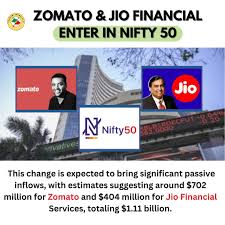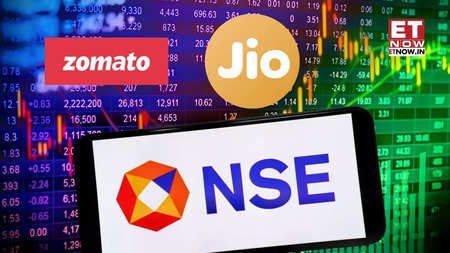Zomato, a leading food delivery platform, and Jio Financial Services, a major player in the financial sector, have officially joined the Nifty 50 index following the latest semi-annual reshuffle. This periodic adjustment, conducted to ensure the index reflects the most relevant and high-performing companies, has led to the exclusion of Bharat Petroleum Corporation Limited (BPCL) and Britannia Industries.

The inclusion of Zomato and Jio Financial highlights the growing importance of the digital economy and financial services in India’s evolving market landscape. Meanwhile, the removal of BPCL and Britannia indicates a shift in market dynamics, with the index adapting to reflect the changing priorities and performance of companies across various sectors.
The changes to the Nifty 50 index, including the inclusion of Zomato and Jio Financial Services and the exclusion of Bharat Petroleum Corporation Limited (BPCL) and Britannia Industries, are set to take effect from March 28, 2025. This means the final day for the current composition of the index will be March 27, 2025.
The decision was made following a meeting of the National Stock Exchange (NSE) Sub-Committee, which took place today. This committee periodically reviews the composition of the Nifty 50 to ensure that it accurately reflects market trends and the evolving performance of India’s leading companies. The reshuffle is part of the routine semi-annual review process aimed at maintaining the relevance and balance of the index in response to market developments.
The inclusion of Zomato and Jio Financial Services in the Nifty 50 index is based on their six-month average free-float market capitalisation, as outlined in the official statement. According to the criteria, their market capitalisation within the eligible universe not only meets but exceeds the required threshold for inclusion. Specifically, the six-month average free-float market capitalisation of both companies is at least 1.5 times greater than that of the smallest current constituents of the index, namely Bharat Petroleum Corporation Limited (BPCL) and Britannia Industries.
This significant difference in market capitalisation played a key role in the decision to add Zomato and Jio Financial Services to the index, leading to the removal of BPCL and Britannia. The adjustment reflects the index’s objective to represent the most influential and high-performing companies in the Indian stock market.
According to a note from the National Stock Exchange (NSE), Zomato’s average free-float market capitalisation has been recorded at ₹1,69,837 crore, while Jio Financial Services has achieved an average market capitalisation of ₹1,04,387 crore. In comparison, Bharat Petroleum Corporation Limited (BPCL) and Britannia Industries reported significantly lower figures, with BPCL at ₹60,928 crore and Britannia at ₹64,151 crore. This substantial difference in market capitalisation has contributed to the inclusion of Zomato and Jio Financial Services in the Nifty 50 index, replacing BPCL and Britannia.
Projections from JM Financial suggest that Zomato’s addition to the index could result in passive inflows of approximately $702 million as index funds adjust their portfolios to reflect the new composition. Similarly, Jio Financial Services is expected to attract inflows of around $404 million. On the other hand, with their removal from the index, BPCL and Britannia Industries may experience outflows of approximately $240 million and $260 million, respectively. These changes reflect the typical market adjustments that occur when companies enter or exit major indices like the Nifty 50, as index-linked funds realign their holdings to match the updated benchmark.
According to the note, the next two companies eligible for potential inclusion in the Nifty 50 index were InterGlobe Aviation, with an average six-month free-float market capitalisation of ₹86,688 crore, and Hindustan Aeronautics Limited (HAL), with ₹82,993 crore. However, neither of these companies was considered for inclusion in the index.
The reason for their exclusion lies in the eligibility criteria, which require a company’s six-month average free-float market capitalisation to be at least 1.5 times greater than that of the lowest-ranked existing Nifty 50 constituents. In this case, the benchmark for comparison was set by Hero MotoCorp and Eicher Motors, which recorded average market capitalisations of ₹64,181 crore and ₹66,764 crore, respectively. Since both InterGlobe Aviation and HAL fell short of surpassing this 1.5-times threshold, they were not included in the index during this reshuffle. This decision aligns with the Nifty 50’s methodology, which ensures that only the most prominent companies with significant market influence are represented in the index.
For a stock to be eligible for inclusion in the Nifty 50 index, it must be available for trading in the Futures & Options (F&O) segment of the National Stock Exchange (NSE). This requirement ensures that only highly liquid and actively traded stocks are considered for inclusion.
The F&O segment allows for the trading of derivative contracts, such as futures and options, which are typically associated with stocks that have high market participation and sufficient liquidity. By limiting eligibility to stocks listed in this segment, the Nifty 50 maintains its focus on companies that not only have strong market capitalisation but also exhibit consistent trading activity, making them suitable for a wide range of investment strategies and market participants.
The Nifty 50 index undergoes a semi-annual rebalancing process managed by NSE Indices, a subsidiary of the National Stock Exchange (NSE), which is India’s largest stock exchange. This rebalancing follows a well-defined schedule, with two key cut-off dates set each year—January 31 and July 31. During this process, stocks are assessed based on their average performance over the preceding six months. This evaluation ensures that the index remains up-to-date with the latest market trends and accurately reflects the evolving dynamics of India’s financial landscape.
To allow market participants sufficient time to adjust their investment strategies, NSE Indices issues a four-week advance notice before implementing any changes to the index composition. This practice ensures transparency and provides investors with the necessary time to realign their portfolios in response to the updated index structure.
Zomato’s rapid growth in the market was notably recognized in December of last year when it became the first new-age tech company to be included in the BSE Sensex, India’s benchmark stock index for the Bombay Stock Exchange (BSE). This milestone came after Zomato replaced JSW Steel during a similar half-yearly rebalancing. Likewise, Jio Financial Services, which was demerged from Reliance Industries in 2023, has seen increasing interest from institutional investors, further solidifying its position as a significant player in the financial sector.
Inclusion in the Nifty 50 index often results in a re-rating of the stocks involved, meaning their valuations are reassessed by market analysts and investors. This typically leads to increased attention from institutional investors, especially those managing passive funds and exchange-traded funds (ETFs) that track the performance of the index.
Historically, companies added to the Nifty 50 have experienced notable price movements in anticipation of the rebalancing process, as market participants adjust their holdings to align with the updated index composition. This surge in activity is driven by the expectation of higher demand from institutional investors and index-linked funds.
The upcoming rebalancing, which is scheduled to take effect on March 28, 2025, is expected to follow a similar trend, with adjustments made by both active and passive investors ahead of the official implementation date. This reflects the influence of the Nifty 50 index as a benchmark for the Indian equity market and its ability to shape investment flows.

